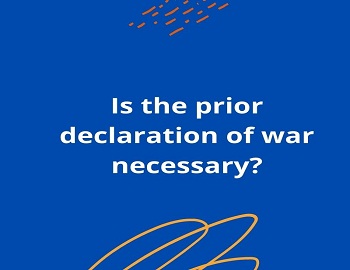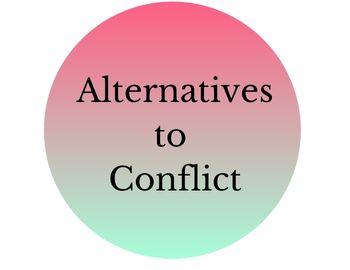Is the prior declaration of war necessary?
According to Oppenheim, “War is a contention between two or more states through their armed forces, for the purpose of overpowering each other and imposing such conditions of peace as the victor pleases”.
According to Lawrence, “War may be defined as a contest carried on by public forces between states, or between states and communities having with regard to the contest right of states, the parties to it having the intention of ending the peaceful relations, and substituting for them those of hostility with all the legal incidents thereof”.
According to Wrestlake, “War is the condition or state of the governments contending by force”.
According to Kelson, “War is, in principle, an enforcement of action involving the use of armed force performed by one state against another constituting as it does an unlimited interference in the sphere of the interests of the other state”.
According to Hall, “When differences between states reach a point at which both parties resort to force, or one of them does acts of violence, which the other chooses to look upon as a breach of peace, the relation of war is set up, in which the combatants may use regulated violence against each other until one of the two has been brought to accept such terms as his enemy is willing to grant”. This definition of war by Hall was also accepted by the court of law in Driefontein Consolidated Gold Mines Vs. Jonson (1960).
According to Starke, “War in its most generally understood sense is a contest between two or more states primarily through their armed forces, the ultimate purpose of each contestant group being to vanquish the other or others and impose its own conditions of peace”.
After going through all the above-mentioned definitions, we arrive at the conclusion that war is a contest carried on by armed forces between two or more states, the ultimate purpose of each contestant is to vanquish the other and impose its own terms of peace. It means that the following elements constitute a war-
(1) There must be a contest of armed forces.
(2) The contest must be between two or more states.
(3) The ultimate aim of the contest is to conquer the other.
However, in certain cases, it is not necessary that after the cessation of armed conflict the war comes to an end. Japan and Germany remained at war with their conquerors even after the end of the armed conflict. Sometimes also it is not necessary that a state should actively engage its armed forces into conflict to indulge in war. During the Second World War, many states were at war though their forces were not physically participating.
Declaration of War- There is a lot of difference in theory and practice regarding the declaration of war. International morality envisages that there should be a prior declaration of war before a state actually embarks upon war. Morality requires that the opponent should not be caught unaware. He should be sufficiently warned before he is attacked. It is a cowardly act to take the enemy by surprise. It is due to this reason that the institution of the declaration of war came into being. Grotius is of the view that a prior declaration of war is essential and if a state wages a war on another state without declaring the same, it commits a breach of International Law.
Prior to the Hague Convention of 1907, the formal declaration of war was a customary act on the part of a state. This declaration was made official at the government level or through the diplomatic channels of a state. A state would announce the date and time at which it would consider it at a state of war with another state. However, the Hague Convention of 1907 made the prior declaration is obligatory. Clause 3 of the convention provided, “This Convention recognizes that as between the contracting power hostilities ought not to commence without previous and expressive notice in the form of either a declaration of war stating the grounds on which it is based or an ultimatum, containing a conditional declaration of war”. Article 2 further provided that the neutral powers are also to be notified by a notice regarding the existence of the state of war. However neutral states cannot plead ignorance if they knew it from other sources.
In actual practice, this principle has been flagrantly violated by states and they have paid little attention to the resolutions adopted at Hague. It was in 1931 that Japan conquered Manchuria and Italy invaded Abyssinia without making any prior declaration of war. In 1934 again Japan commenced hostilities against Russia without a declaration of war. The Second World War also started without an actual declaration of war. In 1939 it was Germany that attacked Poland suddenly and again in 1941 it attacked Soviet Russia. In 1940 Germany invaded Denmark and Norway without any announcement. Russia also invaded Poland and Finland without a prior declaration. Japan also attacked the United States fleet in Pearl Harbour in the same manner. In 1950 North Korea attacked South Korea without any declaration and so did China against India in 1962.









Comments (No)